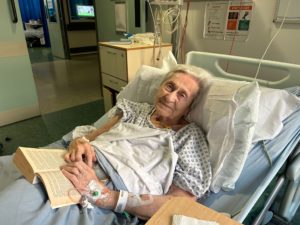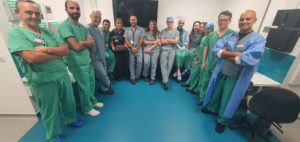St George’s mends broken hearts
St George’s has doubled the number of hearts it has fixed in two years through a less invasive procedure called TAVI.
The structural heart intervention service has been going from strength to strength helping deliver the best possible care to patients.
Led by Professor Stephen Brecker, the team has taken on a new consultant, upped the service from one day a week to two and five new state-of-the-art cath labs have opened at St George’s.
This has enabled the team to go from fitting 128 in 2020, to 147 in 2021 and 237 in 2022.
Maria Beasley, 93, had a pacemaker fitted and six weeks later had a TAVI fitted after doctors’ orders were that she needed both. She said:
“The whole team have been marvellous. I had my procedure yesterday, it was so quick, I was in by 10 and out by 11am. I’m now able to get back to my daughter and family whom I live with.”

Most procedures for patients to be fitted with a life-changing TAVI go ahead within just a month’s time of the decision being made, with variation between around three weeks up to two months.
Professor Stephen Brecker has fitted over 1000 TAVIs at St George’s, he said:
“Reaching fitting well over 200 TAVIs in 2022 represents a fantastic development in the structural heart intervention service at St George’s and patients are benefitting from rapid treatment in our new world-class cath lab facilities”.
TAVIs (Transcatheter Aortic Valve Implantations), are valves that are fitted to the heart to treat aortic stenosis, which occurs when the valve in the heart narrows, restricting blood flow.

The procedure is carried out via a tube from the groin making it less invasive than other types of surgery.
Post-procedure, most patients will only need to be kept in the hospital for a couple of days to be monitored, making more beds available compared to if those patients had surgery where they would need to stay in hospital much longer post-operation.
Dr Luci Etheridge, Chief Medical Officer for St George’s, said:
“Being able to up our capacity to fit patients with TAVIs means we’re getting them seen sooner and improving their quality of life in a less invasive way than surgery. I’m very grateful to our structural heart team for continually innovating and improving the service”
The team is doing particularly well as during the pandemic they only paused procedures for three weeks.
Yet also during this time, they took on younger patients to be fitted with TAVIs while surgery for this group was paused.
TAVIs are usually offered to patients in their 80s and 90s, a cohort of patients who would likely be too high risk for surgical aortic valve replacement. In the past, these patients would have to manage their condition medically and some of them would have been at risk of passing away from their stenosis.
Most chest pain is not a sign of anything serious but you should get medical advice just in case. Get immediate medical help by calling 999 if you think you’re having a heart attack.
Notes to editors
Information about different Aortic Valve replacement procedures can be found on the NHS website.
TAVIs were introduced around 20 years ago and St George’s Hospital has offered the procedure for roughly 15 years.


